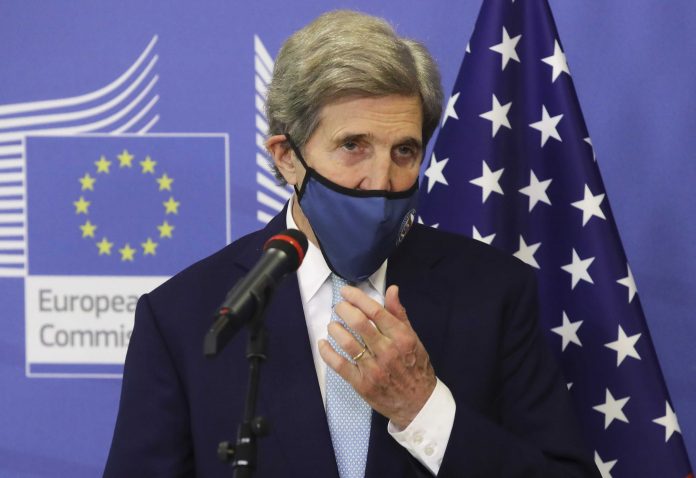
By SAMUEL PETREQUIN
Associated Press
BRUSSELS (AP) — U.S. special envoy for climate John Kerry traveled to Brussels on Tuesday to relaunch trans-Atlantic cooperation with European officials in the wake of President Joe Biden’s decision to rejoin the global effort to curb climate change.
Like EU Commission President Ursula von der Leyen, Biden has said that fighting global warming is among his highest priorities. Biden had the United States rejoin the Paris climate accord in the first hours of his presidency, undoing the U.S. withdrawal ordered by predecessor Donald Trump.
Kerry was welcomed by the EU Commission vice-president in charge of climate action, Frans Timmermans, for discussions focusing on the next U.N. climate summit, taking place in Glasgow in November. He also held talks with von der Leyen and other EU officials during a weekly commission meeting on trans-Atlantic climate action.
Kerry insisted the partnership should “even be stronger now.”
“We face an extraordinary crisis, because the science is screaming at us, the evidence grows by the year,” said Kerry, a former U.S. Secretary of State. “Last year, again, hottest year in history. … So this is a crisis, the climate crisis. But it’s also a moment of the greatest opportunity that we’ve had since perhaps the industrial revolution.”
The 2015 Paris climate change accord commits countries to put forward plans for reducing their emissions of greenhouse gases such as carbon dioxide, which is released from burning fossil fuels. European Union leaders reached a hard-fought deal in December to cut the bloc’s net greenhouse gas emissions by at least 55% by 2030 compared with 1990 levels.
The EU wants to be a leader in the fight against global warming and has pledged to reach climate neutrality by mid-century as part of its European Green Deal action plan. The Biden administration has yet to announce a new national 2030 target for cutting U.S. fossil fuel emissions.
“We have no better partners than our friends here in Europe and the EU, it is important for us to align ourselves now, which is what we will discuss today, because no one country can resolve this crisis,” Kerry said. “It will take every country.”
Experts say any international efforts to keep global warming well below 2 degrees Celsius (3.6 degrees Fahrenheit) — or ideally 1.5 degrees C (2.7 degrees F) as agreed in the Paris accord — would struggle without the contribution of U.S., the world’s second-biggest carbon emitter after China. Scientists say time is running out to reach that goal because the world has already warmed 1.2 degrees C (2.2 degrees F) since pre-industrial times.
“Paris does not alone get the job done,” Kerry said. “The scientists tell us: This decade, 2020 to 2030, must be the decade of action.”
In addition to the U.N. climate summit in November, Kerry planned to discuss preparations for a U.S.-hosted climate leaders summit on April 22-23. Kerry was also set to meet with the bloc’s top diplomat, Josep Borrell.















